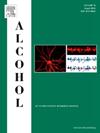Exploring epigenetic modification of the stress-related FKBP5 gene in mice exposed to alcohol during early postnatal development
IF 2.9
4区 医学
Q3 PHARMACOLOGY & PHARMACY
引用次数: 0
Abstract
Early developmental exposure to alcohol has been implicated in adverse effects on the brain, often associated with the onset of neurodevelopmental disorders. Moreover, maternal alcohol consumption during pregnancy has been linked to the manifestation of mental health disorders, such as depression and anxiety, in subsequent generations. These mood disturbances may be attributed to alterations in protein expressions related to depression and anxiety within the hippocampus. While the precise mechanisms remain elusive, it is likely that pre- and postnatal exposure to alcohol induces changes in hippocampus, potentially through epigenetic modifications. The FKBP5 gene, known to modulate the stress response, is particularly relevant in this context. We postulate that alcohol-induced methylation of the FKBP5 gene disrupts HPA axis function, thereby prompting individuals to anxiety-like and depressive-like behaviors. To investigate this hypothesis, female C57BL/6 pups were subjected to early alcohol exposure via intubation with ethanol mixed in artificial milk from Postnatal Day 3 to Day 20. The intubation control pups were subjected to the same procedures without ethanol or milk, and a non-intubated control group included. Anxiety-like and depressive-like behaviors were assessed using the open field test, plus maze test, forced swim test, and tail suspension test when the pups reached 3 months of age. For epigenetic analysis of the FKBP5 gene, genomic DNA was isolated from hippocampal tissues and subjected to bisulfite conversion to distinguish methylated and unmethylated cytosines. Then, methylation-specific PCR was performed to assess methylation levels. Pups exposed to early postnatal alcohol exhibited increased levels of depression-like behavior and susceptibility to anxiety-like behavior during adolescence, as verified by behavioral assessments. Methylation profiling revealed higher rates of methylation within the stress-associated gene FKBP5 in both the early postnatal alcohol-exposed cohort (13.82%) and the intubation control group (3.93%), in contrast to the control cohort devoid of stress or alcohol exposure. These findings suggest a potential epigenetic mechanism underlying the observed behavioral alterations, implicating FKBP5 methylation as a candidate mediator of the increased vulnerability to mood disorders following early postnatal alcohol exposure.
探索在小鼠出生后早期发育过程中暴露于酒精的应激相关 FKBP5 基因的表观遗传修饰。
发育早期接触酒精会对大脑产生不良影响,通常与神经发育障碍的发病有关。此外,母亲在怀孕期间饮酒也与后代出现抑郁和焦虑等精神疾病有关。这些情绪障碍可能是由于海马中与抑郁和焦虑有关的蛋白质表达发生了改变。虽然确切的机制仍难以捉摸,但产前产后接触酒精很可能通过表观遗传修饰诱导海马体发生变化。众所周知,FKBP5 基因能调节应激反应,因此在这方面尤为重要。我们推测,酒精诱导的 FKBP5 基因甲基化会破坏 HPA 轴的功能,从而促使个体出现焦虑样和抑郁样行为。为了研究这一假设,我们在雌性 C57BL/6 幼崽出生后第 3 天至第 20 天期间,通过插管将乙醇混入人工乳中,使其早期暴露于酒精。插管对照组幼崽接受相同的程序,不含乙醇或牛奶,并包括未插管对照组。在幼崽长到3个月大时,用开阔地试验、加迷宫试验、强迫游泳试验和悬尾试验来评估焦虑样和抑郁样行为。为了对FKBP5基因进行表观遗传学分析,研究人员从海马组织中分离出基因组DNA,并对其进行亚硫酸氢盐转换,以区分甲基化和未甲基化的胞嘧啶。然后进行甲基化特异性聚合酶链式反应(PCR)来评估甲基化水平。经行为评估证实,暴露于产后早期酒精的幼崽表现出更高水平的抑郁样行为,并在青春期易出现焦虑样行为。甲基化分析表明,与没有压力或酒精暴露的对照组相比,产后早期酒精暴露组(13.82%)和插管对照组(3.93%)中压力相关基因 FKBP5 的甲基化率更高。这些研究结果表明,所观察到的行为改变背后存在潜在的表观遗传学机制,FKBP5甲基化是导致产后早期酒精暴露后情绪失调脆弱性增加的一个候选介导因子。
本文章由计算机程序翻译,如有差异,请以英文原文为准。
求助全文
约1分钟内获得全文
求助全文
来源期刊

Alcohol
医学-毒理学
CiteScore
4.60
自引率
4.30%
发文量
74
审稿时长
15.6 weeks
期刊介绍:
Alcohol is an international, peer-reviewed journal that is devoted to publishing multi-disciplinary biomedical research on all aspects of the actions or effects of alcohol on the nervous system or on other organ systems. Emphasis is given to studies into the causes and consequences of alcohol abuse and alcoholism, and biomedical aspects of diagnosis, etiology, treatment or prevention of alcohol-related health effects.
Intended for both research scientists and practicing clinicians, the journal publishes original research on the neurobiological, neurobehavioral, and pathophysiological processes associated with alcohol drinking, alcohol abuse, alcohol-seeking behavior, tolerance, dependence, withdrawal, protracted abstinence, and relapse. In addition, the journal reports studies on the effects alcohol on brain mechanisms of neuroplasticity over the life span, biological factors associated with adolescent alcohol abuse, pharmacotherapeutic strategies in the treatment of alcoholism, biological and biochemical markers of alcohol abuse and alcoholism, pathological effects of uncontrolled drinking, biomedical and molecular factors in the effects on liver, immune system, and other organ systems, and biomedical aspects of fetal alcohol spectrum disorder including mechanisms of damage, diagnosis and early detection, treatment, and prevention. Articles are published from all levels of biomedical inquiry, including the following: molecular and cellular studies of alcohol''s actions in vitro and in vivo; animal model studies of genetic, pharmacological, behavioral, developmental or pathophysiological aspects of alcohol; human studies of genetic, behavioral, cognitive, neuroimaging, or pathological aspects of alcohol drinking; clinical studies of diagnosis (including dual diagnosis), treatment, prevention, and epidemiology. The journal will publish 9 issues per year; the accepted abbreviation for Alcohol for bibliographic citation is Alcohol.
 求助内容:
求助内容: 应助结果提醒方式:
应助结果提醒方式:


